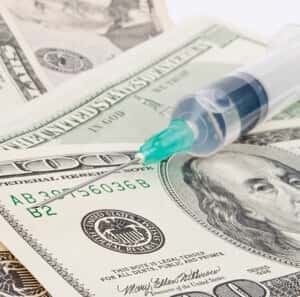
Are you spending more on prescription drugs and enjoying it less? A report from QuintilesIMS Institute shows that prices for medicines are still rising more rapidly than inflation (QuintilesIMS, May 30, 2017).
Prices are not increasing as rapidly as they have been recently, though. Spending on medications went up by less than 6% in 2016, about half the rate in 2014 and 2015. That sounds great, but if you suffer from a rare condition or cancer you still may not be able to afford your medicine.
Increased Total Cost of Prescription Drugs:
The total amount spent on prescription drugs in 2016 was $450 billion. The reason for part of the increased cost is that specialty medicines, which are usually very pricey, account for a bigger part of the bill. These include drugs for cancer, hepatitis C and rare diseases. Billions are spent on medicines like Humira, Remicade and Enbrel. Such drugs are prescribed for rheumatoid arthritis, psoriasis, ulcerative colitis and other autoimmune diseases.
It is not unusual for a new cancer drug to cost over $100,000 a year. Even if you “only” have to pay 10% for your co-pay, that could represent more than $10,000 a year. Can you afford your medicine bill if it is nearly $1,000 a month?
Virginia in Greensboro, NC, shared this story:
“Three years ago I was prescribed Asacol HD for ulcerative colitis. It was $79 for a month’s supply. Now, it’s over $600 for the same drug, same amount of pills. I have now been prescribed a generic (sulfasalazine) which is $2.00 – go figure. I would rather not take anything.”
Between a Rock and a Hard Place:
Here is the dilemma facing millions of Americans. Generic drugs now account for nearly 9 out of every 10 prescriptions filled in the U.S. The generic pharmaceutical industry states that 88% of all prescriptions filled are generic. That represents huge savings. Normally, we would be thrilled with such a report. The problem is that there are disturbing questions about the quality of many generic medications.
Have you ever wondered how you can pay $4 for a month’s supply of a blood pressure medicine or $10 for a three-month’s supply of a cholesterol-lowering medication? The reason many generic drugs are so inexpensive is because they are often made abroad. The raw ingredients may come from Chinese chemical plants. The pills may be assembled in India, Thailand or Croatia.
FDA oversight leaves a lot to be desired. Virginia’s generic medicine was only $2, whereas the brand name was over $600. The FDA insists that regardless of where the pills are made, the products are identical.
The FDA is very proud that it approved more generic drugs last year than in the history of the generic drug program. Not surprisingly, insurance companies are thrilled with this news. It means that they can require patients to buy much less expensive products. Most insurance companies are far less concerned about quality than cost.
How Good is the FDA?
We used to trust the FDA’s ability to oversee generic drug approval and quality. We now have serious questions. Here is one article we wrote on this topic.
Generic Drug Costs are Going Up:
For reasons that seem inexplicable, some generic drug prices have gone through the roof. Most people have missed this scandal. It might help account for why you can no longer afford your medicine:
We remain mystified that most Americans do not seem alarmed by the high cost of brand name drugs. And the generic drug scandal has barely made a ripple with doctors or patients. With our annual drug budget nearing $500 billion, we wonder how long this system will be sustainable.

